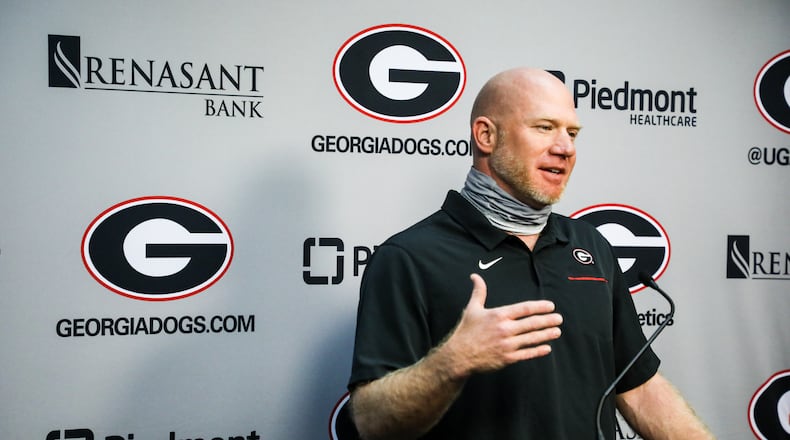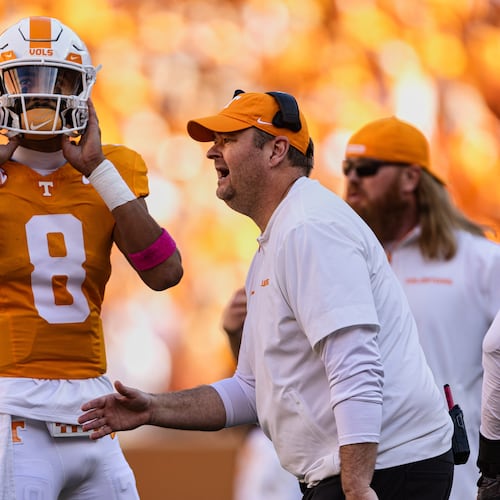ATHENS – In his first exchange with Georgia reporters Friday, the fiery personality that made Scott Cochran a cult-like figure at Alabama was absent for much of what was a 21-minute video conference call.
Then somebody asked him how he would sleep the night before the Bulldogs’ first game, Sept. 26 at Arkansas.
“Sleep? Come on, dog, who’s sleeping?” Cochran shouted. “It’s game day! Can’t eat, can’t sleep. Come on!”
Calming himself ever so slightly, Cochran admitted that will definitely be a nerve-wracking night for him.
“Yes, definitely,” he said. “I’m big on nerves. I’m big on controlling nerves. … I’m nervous to come in here and talk to y’all today. ’Preciate y’all making me making me feel comfortable. But nerves are part of this.”
Cochran then launched into one of his trademark metaphors about controlling nerves before big games.
“You always get butterflies,” he said. “The key is to get them to fly in formation. But if you’re not nervous and anxious, I don’t think it’s important to you.”
That’s probably good advice from a man who is going to be overseeing Georgia’s kicking specialists this season. Cochran, Alabama’s longtime strength-and-conditioning director, was infamously hired away by coach Kirby Smart to become Georgia’s special-teams coordinator in February.
Soon enough, we will all find out if that was the brilliant, targeted strike on Nick Saban’s Alabama empire that the Bulldog Nation believes it is, or a high-risk hire of an under-experienced assistant coach.
Suffice it to say, it’s viewed differently in Athens and Tuscaloosa.
“I think Scott will always be popular here,” said Cecil Hurt, a longtime Tuscaloosa News columnist and the ultimate authority on modern Alabama football. “He’s a big part of a lot of success for Alabama fans, so I don’t think a lot of people begrudge him for wanting to go on the field and going to Georgia. But, at the same time, the reaction here is, if that’s not what coach Saban wanted, then that’s not what’s best.”
Cochran became a part of Bama folklore as Saban’s strength-and-conditioning coach, a post he held 12 years while the Crimson Tide won five national championships during. He acquired another championship ring at LSU in 2003, so he has been part of all six of Saban’s national titles. Cochran was named national strength coach of the year twice, in 2008 and 2011.
For years, in games at Bryant-Denny Stadium, Alabama would play a video of Cochran on the big video board screaming “put up them 4s” at the start of the fourth quarter and “it’s winning time!” He even did some TV commercials with Saban.
But Cochran decided to part ways with Saban in February when he accepted Smart’s offer to become the Bulldogs’ special-teams coordinator. Cochran’s contract with UGA will pay him $1.125 million over the next two years.
It is Cochran’s first stint as an on-field assistant since he graduated from LSU and went to work for University High in Baton Rouge in 1998. But he said sees it just as a natural next step for him.
“I just think it was time,” Cochran said. “It was time for me to transition, and there was no time like the present.”
Cochran always had aspirations of becoming an on-field assistant coach. He discussed it with Saban a few times while at Alabama. Ultimately, though, Saban wasn’t willing to offer Cochran on-the-job training.
“I think coach Saban has my back; I worked for him for 18 years,” Cochran said. “Had the position been open over there, it probably would have been a possibility. But, for me, I want to work for coach Smart. I want to work with somebody who I see eye-to-eye with on a lot of things. … Obviously I wouldn’t be where I am without coach Saban. But with coach Smart there’s a big emphasis on some things I’m big on.”
Indeed, Smart and Cochran are buddies above all else. They were raising young families while working together for nine years at Alabama. They also worked together as single men on the same staff at LSU before that. Their families have vacationed together often.
Accordingly, Smart tried to bring Cochran with him when he left Alabama to become Georgia’s head coach in December of 2015. Saban responded by making Cochran the first strength-and-conditioning director in the nation to earn more than $500,000 in salary. So he stayed.
But Smart continued to come after Cochran. When Scott Fountain left UGA to become Sam Pittman’s special-teams coordinator at Arkansas in January, Smart renewed the discussion. Cochran was hired Feb. 28.
The pandemic shut down college athletics two weeks later.
“It’s been challenging, for sure,” Cochran said. “… I was expecting to get on the road (to recruit). I was expecting to meet guys. And now everything is virtual. That was a bit of a challenge because I like face-to-face, I like to sit down and talk.”
From the outset, Smart expressed confidence that Cochran would be an asset as a recruiter and as an assistant coach. He said Cochran was involved with recruiting and some aspects of special-teams planning at Alabama and that Cochran’s football intelligence and enthusiasm would be beneficial no matter what he was doing for the program.
“Scott has been awesome,” Smart said last Saturday. “He brings great energy in the meetings. He does a tremendous job on the field. The players enjoy being around him. And it’s a team effort. We’ve got every coach on the staff helping with that side of it.”
The Bulldogs are now three weeks from the scheduled start of the season. But No. 4 Georgia’s matchup against No. 2 Alabama – now set for Oct. 17 in Tuscaloosa – arguably is the most anticipated game.
“Just excited, how could you not be?” Cochran said. “Just having football back alone is exciting, but going back there, I mean, every game is important, but when that time comes, it’s going to be great.”
Of course, the reception for Cochran likely will be quite different than it might have been with 101,000 people in attendance. Bryant-Denny, like all SEC venues, will be limited to 20 to 25 percent capacity when the Bulldogs come to visit.
But Hurt doesn’t believe Cochran is seen as a great villain now, or Smart, for that matter.
“Nobody in Tuscaloosa is going to pull for any coach at Georgia to do well,” Hurt said with a laugh. “But, aside from that, I don’t think anybody here’s thinking, ‘Oh, I don’t like Scott Cochran anymore.’ … They certainly want to win the game, so I don’t think Scott Cochran will be the highest priority that day.”
Meanwhile, Alabama’s strength-and-conditioning operation has moved on since Cochran’s departure. According to Hurt, Crimson Tide football is taking a more “scientific approach” to training. It has hired two men from Indiana to replace Cochran: Dr. Matt Rhea as director of performance science and David Ballou as director of sports performance.
As for Cochran, he’s not looking back.
“It’s one of those things that was always in the back of my mind, that I wanted to get on the field,” Cochran said. “To see this side of it and to work this side of it. So when I had the opportunity – come on, man, coach Smart’s the best in the business – so let’s go.”
About the Author
Keep Reading
The Latest
Featured



